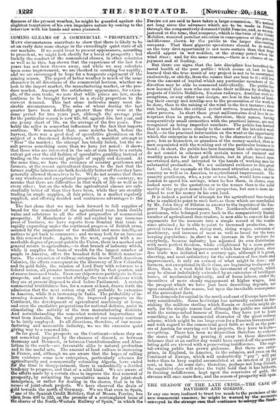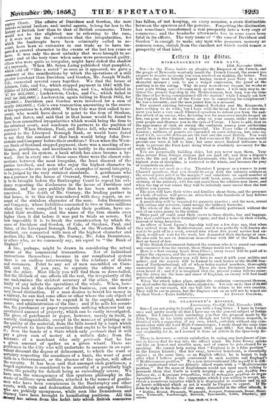THE SHADOW OF THE LATE CRISIS.—THE CASE OF DAVIDSON AND
GORDON. Iv any one were inclined to trust too much to the promises of the new commercial summer, he might be warned by the memento conveyed in the strange case that continues to occupy the
urt.. The. affairs; taf.'Davidson and Gordon, the now repute, Ionia brokers...and 'metal agents, belong far less to the fame ° British la.* than to. that of. British. commerce. There histcrY ironia not be ]the slightest use in referring to the ease, if it were not for. the evidences that .the. irregularities, for which the bankrupts have .been criminally called tcl Re- cant, have lien so- extensive in• our. trade as to have im- ironia not be ]the slightest use in referring to the ease, if it were not for. the evidences that .the. irregularities, for which the bankrupts have .been criminally called tcl Re- cant, have lien so- extensive in• our. trade as to have im- rted a 'general character to the events of the last ten years or ore. It was, only the most unlucky that were brought to ac- est-7 and. at the--very-time when some were pronounced guilty, ethers who were quite as irregular, might have •defied the shadow o-fa reproach. When Mr. Seton Laing published that pamphlet, which sold off "like a novel " as soon as it appeared, we gave a summary of the ramifications'by which the operations of a still
eater mercbantlhan 'Davidson and Gordon Mr. Joseph Windle
o1e, connected several cases together. We find the house of Johnson, Cole, and Co., which stopped payment in 1847 with lia- bilities of 153,0001. ; Sarge.nt, .Gordon, and Co., which failed in /47 for 462,0004 ; Larkerstein, Crake, and Co., 'which failed in 1847 for 209,0001. ' • Lackerstein again failing in March 1852, for 212,0001. ; Davidson and Gordon were involved for a. sum of nearly 500,0001.; Cole's own transaction amounting' in the course of his operatiensto1,500,0001. . When Cole was first called to ac- count, who would ,have dared to point to the firm of Strahan, Paul, and Bates, and said that in that house would be found to have been committed irregularities which would bring the firm to the criminal court, and condemn its partners to the position of convicts? When Strahan, Paul, and Bates fell, who would have pointed to the Liverpool Borough Bank, or would have dared to say that the conduct of that bank would bring John Den- nistoun and Company before their creditors ? Even when the West- ern Bank of Scotland stopped payment, there was a meeting of no- blemen, gentlemen, and merchants to testify to the soundness of the bank and its system, a bank which has since become a by- word. But in every one of these cases there were the closest con- nections_ between the most irregular, the least discreet of the parties involved, and men who enjoy the highest character in commerce'--who are in point of fact, examples of moral integrity, to be judged by the.very strictest standards. A gentleman who was a partner in the house of Overend, Gurney, and Company, is to be brought before the Bankruptcy Court to repeat his evi- dence respecting the disclosures in the house of Davidson and Gordon, and he says publicly that he has been much mis- conceived. The death of Mr. Gurney, the leading partner in that house, is to this day remembered with deep regret, on ac- count of the stainless character of the man. John Dennistoun and Company, whose liabilities amounted to two or three millions when they were compelled to explain their position, have sa- tisfied their creditors, and the name of the firm stands even higher than it did before it was put to trials so severe. Yet how impossible it is to break the concatenation by which the cases of Davidson and Gordon, of Cole, of Strahan, Paul, and Bates, of the Liverpool Borough Bank, or the Western Bank of Scotland, are connected with men of the highest character and position like Mr. Chapman, Mr. Gurney, Mr. John Dennistoun, or others who, as we commonly say, are equal to " the Bank of England"?
A line, perhaps, might be drawn in considering the actual
nature of the commercial transactions. Not of individual transactions themselves ; because in our complicated system there is an endless interweaving in the relations of dealers and customers. Point to any set of men assembled on Corn- hill, and try, if you can, to separate the affairs of one from the other. Most likely you will find them so dove-tailed, that the ill-luck of one affects all the rest, the irregularity of the one undermines the strictest accuracy of the other, the moral laxity of any infects the operations of the whole. When, how- ever, you. look at the character of the business, you can draw a Very broad distinction. If a man desires to invest his money in a railway, he can find some office or other where the sole object of receiving money would be to expend it in the capital, mainte- nance, and administration of the line ; and if lie sells his securi- ties, the parchment or paper represents nothing whatever but an ascertained amount of property, which can be easily. investigated. The piece of parchment or paper, however, merely in itself, is scarcely distinguishable, except in the manner of printing or in the quality of the material, from the bills issued by a bank which only pretends to have the securities that ought to be lodged with it; from the bonds of a State which only pretends that it will pay a given sum of money at a certain date ; from the warrants of a merchant who only pretends that he has a given amount of spelter on a given wharf. There are gentlemen in the City who will undertake to measure in an equi- .Yalent discount the degree of debasement, to which the want of
Certainty respecting the soundness of a bank, the want of good faith in a Government, or the absence of the speller, will affect the security. It has been said that amongst such gentlemen, a forged signature is considered to be security of a peculiarly high ,ralue, the penalty for default being so exceedingly severe. We L seen the consequences of this spurious philosophy in the waste of millions upon millions, attached to the names of gentle- men who have been conspicuous in the Bankruptcy and other courts, with ruin and destruction distributed amongst families Who are publicly anonymous, while men, like Dennistoun and Unrney have been brought to humiliating. position.% All thug
galiferY. Lae trom..the..habit. intp *Wall conanaeree
has fallen, ofinat keeping, -on every'ooeasion, a stertiliatinot* between-the spurious and the gentine. Forgetting the ilistinetioti has sometimes transformed a real prosperity into at. very orgy of commerce ; and the headache afterwards has in some cases been fatal in its-Olds: The Very name of " the case of Daridiani and Gordon" is.eneugh to niake any man who possessea. memory or eenlamon senee,, shrink from the sun:dieet act which goad unionist prosperity of that kind.



























 Previous page
Previous page